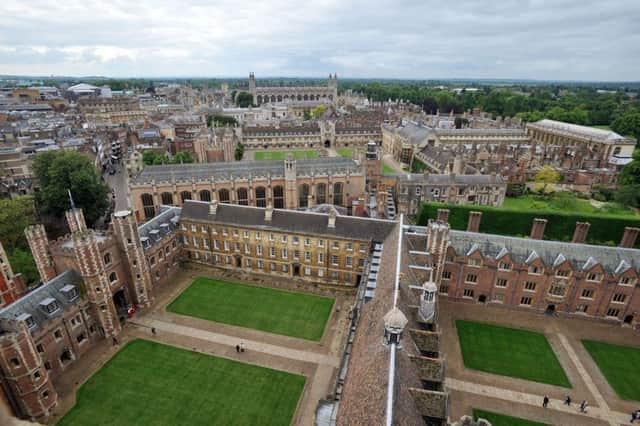Oxbridge admission process '˜is deterring poor bright pupils'


The prestigious universities should simplify the process to help those that are confused or unfamiliar with it, according to a new report.
The findings come after Cambridge University announced it was introducing written tests for all potential students, and Prime Minister David Cameron warned education institutions, that they needed to do more to tackle social inequality.
Advertisement
Hide AdAdvertisement
Hide AdThe new study, published by the Sutton Trust today, argues that the applications systems for Oxford and Cambridge are too complex and lead to confusion for some students. Students applying to study at the universities may have to undergo different interviews, tests and written assessments depending on the course and college they are applying to, the Trust claims. “Both universities evaluate many different aspects of a prospective student’s application in great detail,” the study says.“But this means that there is significant complexity in the admissions system to both universities which can seem off-putting to students unfamiliar with the process who may have little support from their schools.”
It also warns that interviews “can be intimidating for young people, not least to those who have not had significant preparation and support to prepare.”
Sir Peter Lampl, chair of the Sutton Trust, said: “Over the last two decades we at the Sutton Trust have worked very closely with both Oxford and Cambridge to increase the proportion of state schools students. This and other outreach initiatives have resulted in 20% more state school students.
“However, more should be done. Our surveys and experience suggest that many bright state school students are put off by the application process which is both intimidating and complex.”
Advertisement
Hide AdAdvertisement
Hide AdAn Oxford University spokeswoman said: “Oxford is committed to transparency and self-scrutiny: we review our selection criteria and admissions policies on an ongoing basis with an eye to ensuring that our processes are fair and do not disproportionately disadvantage any group of candidates.
“Oxford already has a single central application process which candidates use to apply to the university, regardless of college preference.
“While different subjects may vary in the admissions tests or written work they ask candidates for, the application process for all candidates in a given subject is the same and course selection is highly standardised.
“And Oxford already makes extensive use of contextual information about candidates’ backgrounds in shortlisting and making offers to candidates.
Advertisement
Hide AdAdvertisement
Hide AdSpeaking at a conference yesterday Oxford University’s head of student recruitment said it does not interview potential students to be “mean” but to give them a taste of studying at the institution.
The elite institution’s famous interviews are designed to be an “audition” for a tutorial, rather than like a job interview, according to Dr Elizabeth Peachey.
Speaking at a conference held at Wellington College, Berkshire, Dr Peachey said that candidates can sometimes fixate on the interview, when in reality, it is just part of the admissions system.
“Certainly this is the part of the process that students can fixate upon,” she said.
Advertisement
Hide AdAdvertisement
Hide AdThe head of UCAS Mary Curnock Cook was also speaking about university admissions yesterday. She suggested teachers are intentionally bumping up students’ predicted A-level grades to help them win places at top universities, the head of Ucas has suggested. It comes as institutions are now “more flexible” with grade requirements amid intense competition to attract students, Mary Curnock Cook said.
She said some teachers had told her they are “over-predicting” sixth-formers’ results to help them secure initial offers.